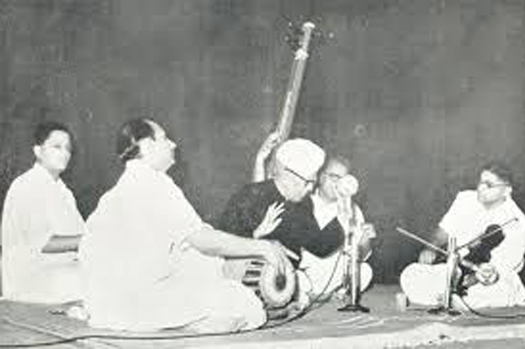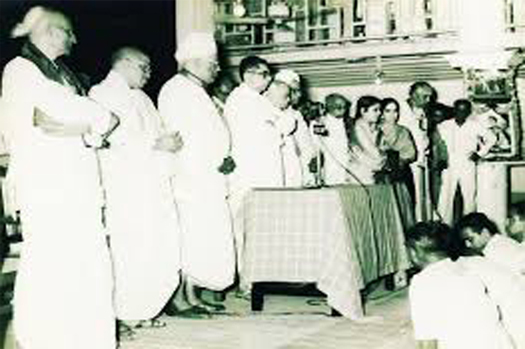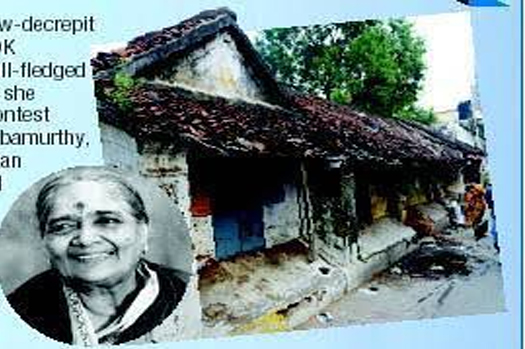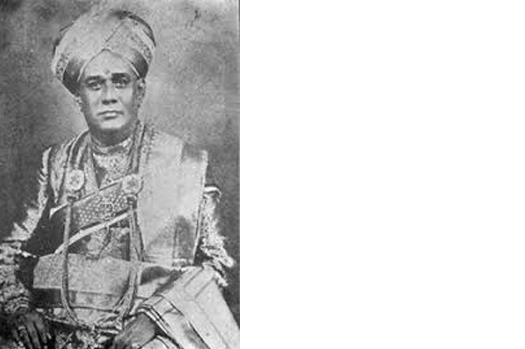

Hon’ble Justice T.L. Venkatarama Iyer hails from Harikesanallur, Tirunelveli District, Tamilnadu and belongs to a rich lineage of traditional wisdom, piety, charity and dedication
In his judicial service, he was known for his laudable traits of honesty, integrity, social empathy and worship of justice. After serving as a lawyer and judge in the High court of Madras till 1953, he became the Justice of Supreme Court of India. His judgments serve as axiomatic testimonials to his sagacity, ethical staunchness and insight as well as elements of humanitarian and social concern, while applying and interpreting law and rendering justice. His personal life also was equally enriched with wisdom quest, discipline, service and principle-modeling. In his illustrious tenure as the Chairman of Law Commission (1958-1961) his modifications and special enactments played an impactful role in making the legal framework more encompassing, unambiguous and effective.
Born in a family of tremendous musical fervor and expertise, which contributed unparalleled veterans like HarikesanallurMutthaiahBhagavatar, his musical talents in raga research, analysis, critical edition and compilation of scholarly and saintly compositions and musical formatting, training and tutelage of musical hymns were great sources of influence and transition in the vital phases of evolution of Carnatic music. Veteran musicians and conversant authorities on the field like M.S. Subbulakshmi and D.K. Pattammal owe their earnest tributes to TLV for shaping, fine-tuning, expanding and elevating their musical establishment and experience.
He was also the member of the Experts Committee of Music Academy. An authority on the compositions of Dikshitar he also authored the biography of Dikshitar entitled ‘The Life of Muthuswami Dikshitar’. In 1944, he received the “Sangeetha Kalanidhi” award, which is the highest award in the field of Carnatic Music, offered by Music Academy, Chennai.
His enthusiasm, erudition and excellence have been nurtured, promoted and fructified by his father, Sri Mahamahopadhyaya M. Lakshmanasuri, author of many numerous masterpieces in various disciplines of Sanskrit lore. As a student of perennial learning, connoisseur of multi-faceted knowledge and benevolent patron of institutions of learning and learned individuals, he had been a founder, guide, consultant, promoter and resourceful irrigator of many scholars, stalwarts and organizations for study and research. Apart from his commitment for preservation and propagation of our fertile heritage and values, he himself is an exponent in Vedas, Shastras and Sanskrit Literature and has authored many expositions to his credit that serve as reservoirs of literary concinnity and resources for reference and research.
Book Written By Justice T.L. Venkatarama Iyer (https://tlvefoundation.org/wp-content/uploads/2023/08/TLV-BROCHURE-1.pdf )




Born on 25th November,1893, he graduated from Madras Christian law College in 1916. Thereafter, he proceeded to do his apprenticeship under Sir Alladi Krishna Swamy Ayyar. He started practicing in the High court of Madras from 1917 onwards. He became the Judge of the High court of Madras on 7th November 1951 and served till 24th November 1953.
After serving as a lawyer and judge in the High court of Madras till 1953, Hon’ble Justice T.L. Venkatarama Iyer became the Justice of Supreme Court of India on 4th January 1954. He held office till 24th November 1958.In his tenure as Justice of Supreme Court, apart from rendering several important judgments, he was also part of the constitutional bench and rendered judgments which till date are considered noteworthy. A link to this is published in the website of the Supreme Court of India:Subsequently he was the Chairman of the Law Commission till 1961.


Hon’ble Justice TL Venkatarama Iyer was closely related to Harikesanallur Muthaiah Bhagavatar and was a disciple of Muthuswami Dikshitar’s grand – nephew, Ambi Dikshitar.He was a member of the Experts Committee of Music Academy and was an authority on the compositions of Dikshitar. He also authored the biography of Dikshitar entitled ‘The Life of Muthuswami Dikshitar’.Hailing from such a musically talented Lineage, the late Justice was also a big maestro in carnatic music.
In April, 1928, an Experts Committee consisting of some of the leading musicians and scholars was also elected to advise the Music Academy on all technical matters including music education on correct and modern lines. He was one among the members of the committee.
Being a son of a great Sanskrit scholar, Sanskrit came naturally to the Justice. He has authored many books which till date are followed in many colleges and institutions. The magnum opus of which is:The musical element in Kalidasa.Nevertheless to say, TLV too, like his father, received the highest title in Sanskrit, Mahamabopadyaya, Justice TL Venkatarama Iyer. It may also not be out of place to mention the scholarly works of TLV’s father Mahamahopaddyaya Shri M Lakshamana Suri: Bhishma Vijayam.
A brief review about this book published by Smt. Vidyasankar ( ref:http://www.indiadivine.org/audarya/sri-vaishnavforum/125668 bhishma-stuthi.html) “Lakshmana Suri, a great Sanskrit scholar, and father of Justice T. L. Venkatarama Iyer, wrote a prose work called Bhishma Vijayam in Sanskrit. Ten years ago, I had the privilege of working on the proof-reading the printer’s drafts, along with my Sanskrit guru, Pandit P. K. Nagaratna Sarma of Bombay. This work is novel in that it is a rendering of the entire Mahabharata from the perspective of Pitamaha Bhishma, and highlights his central role in the epic. This is one of the few works of quality Sanskrit literature to be composed in this century”.



